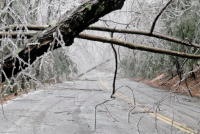Forever frozen in our memories
Five years after ice storm, utilities say they've learned
By Chris Camire, ccamire@sentinelandenterprise.com
Posted: 12/12/2013
On a chilly night in 2008, a freezing rainstorm struck the region, coating much of North Central Massachusetts in a thick layer of glistening ice.
Trees crashed through cars. Utility polls tumbled to the ground like dominoes. Homes and businesses plunged into darkness.

Trees lie strewn across Rindge Road in Fitchburg on the morning of Dec. 12, 2008. Thousands of residents throughout Massachusetts went days, in some cases weeks, without power. SENTINEL & ENTERPRISE FILE PHOTO / BRETT CRAWFORD
When the storm cleared, thousands of residents throughout Massachusetts went days, in some cases weeks, without being able to turn on the lights, watch television or take a shower in their own homes. Public schools canceled classes until the end of the already scheduled Christmas vacation.
Five years later, bitterness over how utilities Unitil and National Grid responded in the storm's aftermath still lingers, but the companies insist they are now ready to respond to a similar emergency with greater success.

A car maneuvers around fallen trees and wires on Franklin Street in Fitchburg on Dec. 12, 2008. Unitil, which serves residents in Fitchburg, Lunenburg, Townsend and Ashby, drew heavy criticism for its slow response. SENTINEL & ENTERPRISE FILE PHOTO / BRETT CRAWFORD
"This year it was a big focus for us, especially with advances in emergency storm planning," said Jake Navarro, a spokesman for National Grid.
In September, National Grid unveiled a detailed plan designed to restore power quicker after a major storm.
The company worked with the Massachusetts Institute of Technology to develop a program that allows it to anticipate what areas could be the most problematic during a storm. It also plans to send community liaisons into the field with tablet computers so they can create a digital map of where the most damage has occurred.
"As we use it more, it might get smarter over time," said Navarro.
National Grid serves more than 3 million customers in Massachusetts, New Hampshire, Rhode Island and New York. During the ice storm the utility giant saw storm outages to about 326,000 customers in Massachusetts alone.
Unitil, which serves residents in Fitchburg, Lunenburg, Townsend and Ashby, has also changed the way it prepares for storms.
The New Hampshire-based company has created a senior-level position to specifically focus on severe weather, said Unitil spokesman Alec O'Meara.
Unitil also now gives police and fire departments a direct 24-hour hotline to special "municipal rooms" in the company's regional emergency operations centers to report trouble spots.

A downed utility pole, wires and trees block Mechanic Street in Fitchburg on the morning of Dec. 12, 2008. SENTINEL & ENTERPRISE FILE PHOTO / BRETT CRAWFORD
And it holds twice-daily conference calls with municipal officials to make sure they are all on the same page before and during a storm.
The company has also beefed up a tree-trimming program and now communicates information about power outages via Twitter and Facebook.
"Our philosophy has been improvement," said O'Meara. "We've looked at every storm, what we've done in the aftermath and refined and made changes to our emergency response plan. Where we are now is the result of all those storms."
The other storms O'Meara is referencing are Hurricane Irene in 2011, a 2011 Halloween snowstorm commonly referred to as "Snowtober," superstorm Sandy and the blizzard last February known as Nemo.
Following the 2008 ice storm, Attorney General Martha Coakley recommended stiff fines for Unitil. The utility was ordered to conduct a comprehensive management audit to correct its failures, but was not fined specifically for its performance.
Unitil was also the only utility not fined after a lengthy investigation by the Department of Public Utilities into how electric companies responded to Irene and the October 2011 snowstorm. National Grid, NStar and Western Massachusetts Electric Company were fined a combined $24.8 million for their inadequate response to those storms.
The 2008 ice storm also led to changes on the legislative level.
Shortly before its one-year anniversary, Gov. Deval Patrick signed legislation subjecting public utilities to steeper penalties for service failures.
Lunenburg resident Cathy Clark, who after the 2008 storm formed a group aimed at driving Unitil out of the region, said the legislation provides "a level of insurance" in the event of a similar storm.
"I think it's an effective piece of legislation," said Clark. "It's why we see such preparation by Unitil before a storm now. If they don't react properly, have the right manpower, restore service, they could be hit with hefty fines."
While larger utilities frustrated customers with the pace of repairs in 2008, municipal utilities such as Groton Electric and Littleton Electric Light & Water Department moved nimbly to restore power. Though 2,500 of the 4,500 customers of Groton Electric Light Department lost power, by Saturday morning, Dec. 13, 97 percent had power restored. By Monday, all but 20 were back on line.
Municipal utilities rushing to make repairs to the system enjoy advantages such as the cooperation and close communication with other departments in town that larger utilities do not have.
State lawmakers are once again pushing a bill to give cities and towns the tools to form their own utilities.
For nearly a century, utility companies have been given veto power over municipalities' efforts to purchase poles and wires from the existing utility and establish their own light authority. This bill would remove that veto power.
"If they have the wherewithal, let the community be the one that makes that decision," said state Rep. Stephen DiNatale, a Fitchburg Democrat who is sponsoring the bill. "These investor-owned utilities are a monopoly."
Follow Chris Camire on Twitter @chriscamire.
